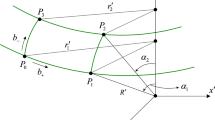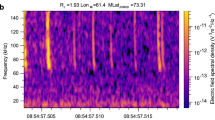Abstract
IT has been suggested1,2 that the enduring column of light left by a meteor in its passage across the sky is produced by radiative recombination of the meteoric ions and free electrons. We wish to criticize this hypothesis on a quantitative basis.
This is a preview of subscription content, access via your institution
Access options
Subscribe to this journal
Receive 51 print issues and online access
$199.00 per year
only $3.90 per issue
Buy this article
- Purchase on Springer Link
- Instant access to full article PDF
Prices may be subject to local taxes which are calculated during checkout
Similar content being viewed by others
References
Millman, P. M., J. Roy. Astro. Soc. Can., 44, 209 (1950).
Öpik, E. J., Proc. Roy. Soc., A, 230, 463 (1955).
Greenhow, J. S., and Hawkins, G. S., Nature, 170, 355 (1952).
Greenhow, J. S., and Neufeld, E. L., J. Atmos. Terr. Phys., 6, 100 (1955).
Cook, A. F., and Millman, P. M., Astrophys. J., 121, 250 (1955).
Whipple, F. L., I.A.U. Publication (in the press).
Author information
Authors and Affiliations
Rights and permissions
About this article
Cite this article
HAWKINS, G., COOK, A. Inadequacy of Recombination as the Source of Light from Enduring Meteor Trains. Nature 178, 161–162 (1956). https://doi.org/10.1038/178161b0
Issue Date:
DOI: https://doi.org/10.1038/178161b0
Comments
By submitting a comment you agree to abide by our Terms and Community Guidelines. If you find something abusive or that does not comply with our terms or guidelines please flag it as inappropriate.



